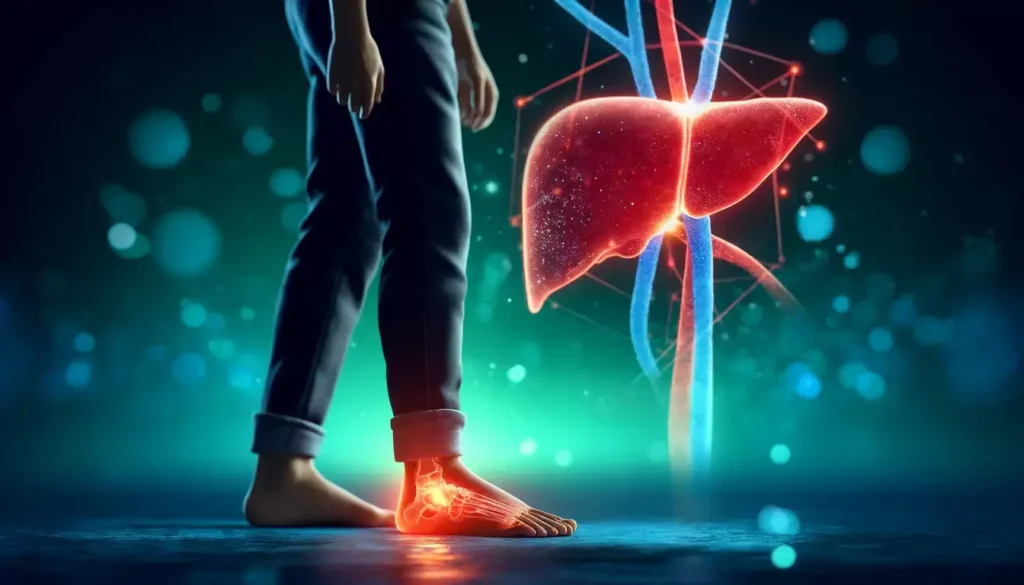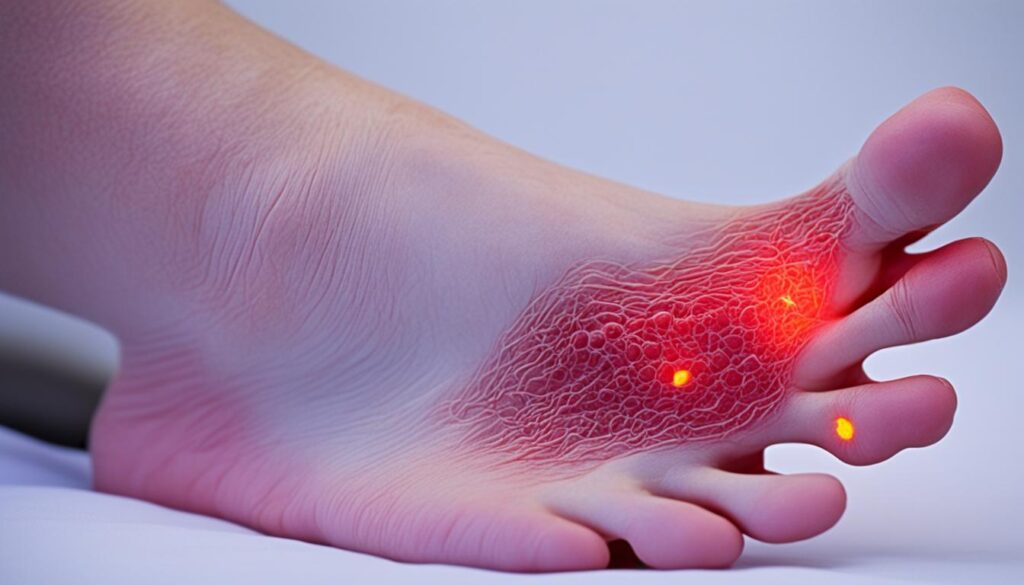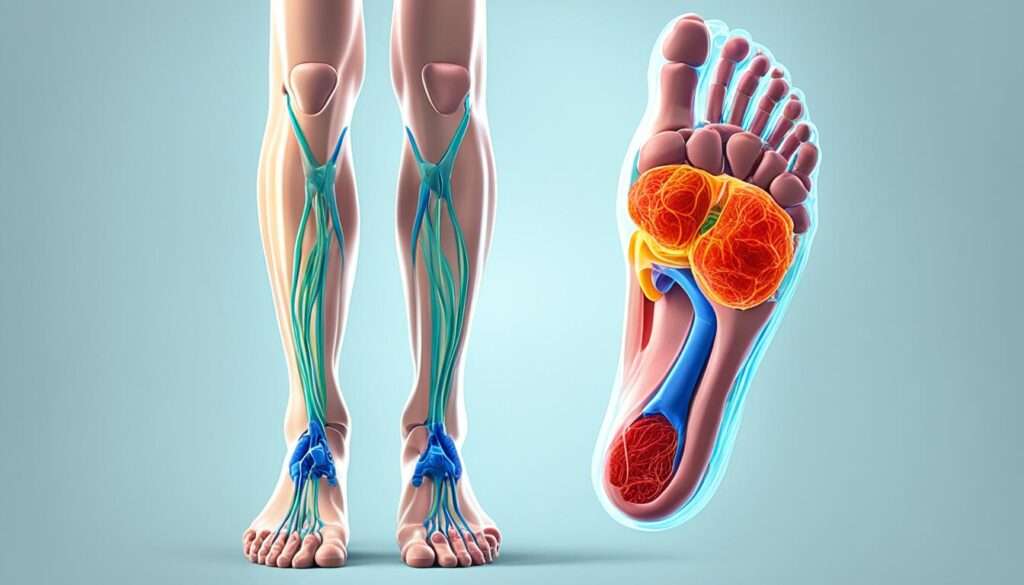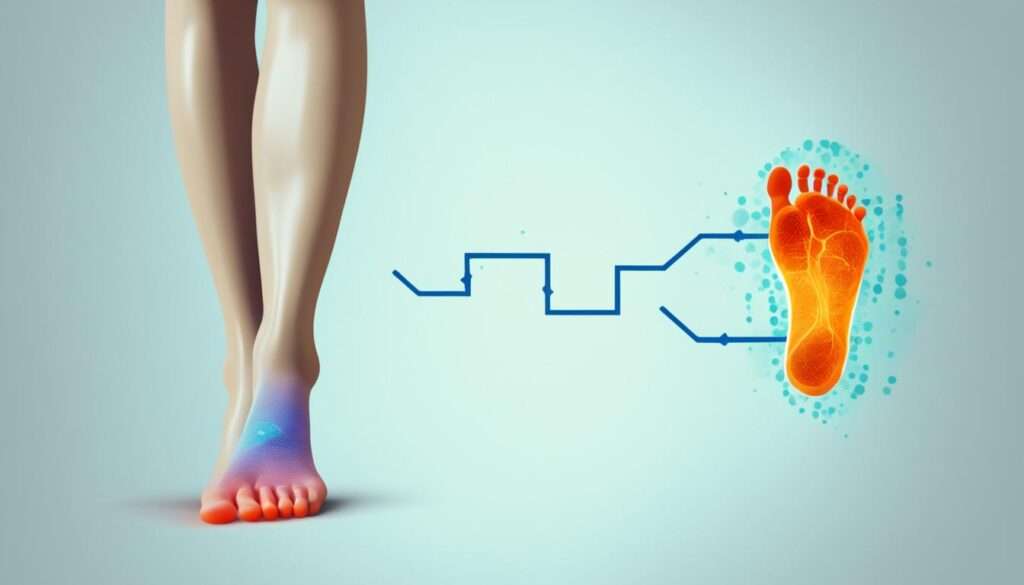The health of your liver is crucial to your overall well-being, playing a vital role in over 500 essential bodily functions. “The Shocking Link Between Your Feet and Your Liver” highlights a surprisingly strong connection that the majority of people are unaware of. Symptoms in your feet, such as swelling, itchiness, pain, and numbness, can be signs of underlying liver problems.
This connection is rooted in the body’s intricate energy pathways and circulatory system, which link the feet to the liver through reflexology and body interconnectedness. Understanding this foot-liver connection is essential for preventive care and maintaining holistic wellness.
By recognizing that your foot symptoms could indicate a larger liver issue, you can take proactive steps to address potential liver dysfunction before it progresses into more serious health problems.
This article will explore how liver issues can manifest in the feet, providing you with the knowledge to detect and treat liver-related health concerns early.
We will delve into the specific symptoms that may appear in your feet and explain how they are connected to liver conditions such as cirrhosis, hepatitis, liver cancer, and fatty liver disease. Additionally, we will discuss the importance of maintaining liver health through lifestyle changes, early detection, and holistic wellness practices.
By the end of this article, you will have a comprehensive understanding of the shocking link between your feet and your liver, empowering you to take charge of your health and well-being.

Liver’s Role in Overall Health
Essential Functions
The liver is a remarkably versatile organ, responsible for over 500 essential functions that are vital to the body’s interconnectedness and holistic well-being. Among its many duties, the liver plays a crucial role in filtering the blood, removing toxins and waste products, and producing bile necessary for digestion.
This vital organ also helps regulate blood sugar levels, synthesizes proteins important for blood clotting, and stores essential vitamins and minerals. The liver’s ability to metabolize drugs and detoxify harmful substances underscores its importance in maintaining the body’s overall balance and function.
By performing these numerous and diverse tasks, the liver supports the proper functioning of nearly every other organ in the body. Without a healthy liver, the body’s ability to process nutrients, eliminate waste, and fight infections would be severely compromised.
Recognizing the wide range of the liver’s essential functions highlights the importance of maintaining liver health for overall well-being.
Importance of Liver Health
Given the liver’s pivotal role in the body’s overall health, it is crucial to prioritize liver health. Liver dysfunction can lead to a variety of serious health issues, including metabolic imbalances, circulatory problems, and compromised immune function.
Early detection and treatment of liver-related issues can prevent the progression of diseases such as cirrhosis, hepatitis, liver cancer, and fatty liver disease.
Maintaining a healthy liver involves adopting a balanced diet rich in nutrients, engaging in regular physical activity, and avoiding excessive alcohol consumption. Additionally, managing risk factors such as obesity and diabetes is essential for preventing liver disease.
By recognizing the warning signs of liver problems, such as those manifested in the feet, individuals can take proactive steps to maintain optimal body balance and holistic well-being.
Understanding the critical role of the liver and its impact on the entire body emphasizes the need for preventive care and timely medical attention. By prioritizing liver health, individuals can ensure their overall health and wellness, protecting themselves from the wide-ranging effects of liver dysfunction.
The Foot-Liver Connection
Symptoms to Watch For
The connection between the health of your feet and the health of your liver is a fascinating and important one. According to traditional Chinese medicine and reflexology, the feet are believed to be connected to and reflective of the state of the liver through energetic pathways.
Understanding this connection can provide valuable insights into your overall health and help in the early detection of liver problems. Here are some key symptoms in your feet that might indicate underlying liver issues:
Swollen Feet
Swelling in the feet, ankles, or legs can often be a symptom of liver disease.
Conditions such as cirrhosis, hepatitis B, hepatitis C, liver cancer, and fatty liver disease can lead to fluid buildup in the lower extremities. This occurs because the liver’s impaired function affects its ability to filter and regulate fluids in the body properly. Recognizing swollen feet as a potential sign of liver dysfunction allows for timely diagnosis and treatment.
Itchy Feet
Itchy feet and hands can be a distressing symptom of liver disease, particularly in cases of hepatitis. Known as pruritus, this severe and persistent itchiness often affects the extremities and is due to the liver’s inability to effectively filter toxins and waste products from the body.
While moisturizing routines and topical treatments can provide temporary relief, addressing the underlying liver issue is crucial for the long-term alleviation of the itching.
Foot Pain and Arthritis
The 26 bones and 33 joints in each foot make them highly susceptible to arthritic conditions. Diseases such as obesity and fatty liver disease can contribute to joint pain and inflammation in the feet due to the overall state of inflammation in the body.
This inflammation puts stress on the nerves and leads to foot pain. Addressing underlying liver issues, such as fatty liver disease related to obesity, can help alleviate arthritis symptoms in the feet.
Tingling and Numbness
Persistent tingling, numbness, or a burning sensation in the feet can be a sign of liver problems, particularly hepatitis C infection or other forms of liver disease.
This symptom is often due to peripheral neuropathy, a condition that causes nerve damage outside of the brain and spinal cord. The liver’s impaired function affects its ability to filter toxins and maintain healthy nerve function, leading to these uncomfortable sensations in the feet.
Recognizing these foot-related symptoms and understanding their connection to liver health is essential for early detection and prevention of more serious liver conditions.
By monitoring your foot health and being aware of these signs, you can take proactive steps to address potential liver issues before they progress. This holistic approach to wellness emphasizes the importance of body interconnectedness and the role of preventive care in maintaining overall health.

Swollen Feet and Liver Diseases
Swollen feet can often be a sign of underlying liver diseases. Conditions such as cirrhosis, hepatitis B and C, liver cancer, and fatty liver disease can lead to fluid buildup in the lower extremities.
This swelling occurs because the liver’s impaired function affects its ability to filter and regulate fluids in the body properly. Here, we delve into how each of these liver conditions can cause swollen feet.
Cirrhosis
Cirrhosis is a chronic liver condition characterized by scarring and significant damage to the liver tissue. This scarring impairs the liver’s ability to function properly, leading to various complications, including fluid retention.
As a result, individuals with cirrhosis often experience swelling in the feet and legs. This swelling, known as edema, occurs because the liver can no longer effectively regulate fluid balance, causing it to accumulate in the lower extremities.
Hepatitis B and C
Viral infections such as hepatitis B and hepatitis C can cause inflammation and damage to the liver, leading to swelling in the feet and legs.
These infections impair the liver’s ability to filter toxins and waste products from the blood, resulting in fluid buildup. Edema in the lower extremities is a common symptom in those suffering from chronic hepatitis B and C, highlighting the liver’s crucial role in maintaining fluid balance within the body.
Liver Cancer
Liver cancer, characterized by the presence of malignant tumors in the liver, can also lead to swollen feet and legs. Tumors can obstruct the liver’s ability to function properly, affecting its capacity to filter and regulate fluids.
This obstruction leads to fluid retention and swelling in the lower extremities. Early diagnosis and treatment of liver cancer are essential to manage this symptom and prevent further complications.
Fatty Liver Disease
Fatty liver disease, which occurs when excess fat accumulates in the liver, can impair its function and lead to fluid retention and swelling in the feet. This condition is often associated with obesity and a poor diet, and it can progress to more severe liver damage if left untreated.
Addressing the underlying causes of fatty liver disease, such as improving diet and increasing physical activity, can help alleviate the symptoms, including swollen feet. Recognizing swollen feet as a potential sign of liver dysfunction is important for early diagnosis and treatment.
By understanding the connection between these liver conditions and fluid retention, individuals can seek timely medical advice and take steps to improve their liver health.
This holistic approach to wellness emphasizes the interconnectedness of the body and the importance of preventive care.

Itchy Feet and Hepatitis
Pruritus and Extreme Itching
Itchy feet and hands can be particularly distressing symptoms of liver disease, especially in cases of hepatitis. This condition, known as pruritus, involves severe and persistent itchiness that often affects the extremities.
Pruritus is a result of the liver’s impaired ability to effectively filter toxins and waste products from the blood. When the liver is not functioning properly, these toxins accumulate in the body, leading to irritation of the nerve endings, especially in the hands and feet. This can cause significant discomfort, disrupt sleep, and affect daily activities.
Hepatitis B and C are viral infections that can lead to chronic liver inflammation and damage, exacerbating pruritus. The liver’s inability to remove these waste products efficiently results in their buildup, which then triggers the intense itching sensation. This symptom can be particularly challenging for those suffering from liver disease, as it significantly impacts their quality of life.
Moisture Routines and Treatments
While addressing the root cause of pruritus—liver dysfunction—is crucial, there are also ways to manage and alleviate the symptoms of itchy feet and hands.
Maintaining a consistent moisturizing routine can provide some relief from the discomfort. Using thick, emollient creams and lotions helps to hydrate the skin and reduce the sensation of itching. Applying these moisturizers immediately after bathing can lock in moisture and create a barrier to protect the skin.
Topical treatments, such as those containing menthol or camphor, can provide a cooling sensation that helps to soothe the itch. Antihistamine creams may also be beneficial in reducing the allergic response and providing temporary relief. However, it is important to note that these topical treatments only address the symptoms and not the underlying liver issue.
For long-term relief, addressing the liver disease itself is essential. Medical interventions aimed at treating hepatitis, such as antiviral medications, can help improve liver function and reduce pruritus.
Additionally, lifestyle changes like adopting a healthy diet, reducing alcohol intake, and managing stress can support liver health and alleviate symptoms.
Individuals experiencing persistent or severe itching should seek medical attention to identify and treat the underlying liver condition.
By taking a holistic approach that combines symptom management with treating the root cause, those affected can achieve better overall health and well-being
Arthritis and Foot Pain
Obesity and Fatty Liver Disease
The 26 bones and 33 joints in each foot make them highly susceptible to arthritic conditions, particularly when liver health is compromised.
Obesity, a significant risk factor for developing fatty liver disease, often contributes to arthritis and foot pain. Fatty liver disease occurs when excess fat accumulates in the liver, impairing its function.
This condition is commonly associated with obesity and poor dietary habits. As the liver becomes more burdened with fat, it can lead to inflammation and scarring, known as cirrhosis. When the liver is not functioning optimally, the entire body can be affected, including the joints in the feet.
Pain and discomfort are common symptoms of fatty liver disease, which is characterized by systemic inflammation. This inflammation places extra strain on the body’s nerves and joints. This is particularly evident in the feet, where the added pressure from excess weight can exacerbate arthritic symptoms.
Managing obesity through a balanced diet and regular exercise is crucial to preventing and alleviating the symptoms of fatty liver disease and the associated foot pain.
Inflammation and Nerve Stress
Inflammation is a common consequence of liver dysfunction, and it plays a significant role in causing foot pain and arthritis. The liver’s impaired ability to filter toxins and regulate bodily functions can lead to an overall inflammatory state.
This inflammation can stress the nerves, causing pain, stiffness, and reduced mobility in the feet. Inflammatory conditions, such as those seen in liver diseases like cirrhosis and hepatitis, can directly contribute to the development of arthritis in the feet.
Nerve stress and damage, often a result of chronic liver conditions, can also lead to significant foot pain. Conditions like peripheral neuropathy, which involves nerve damage outside the brain and spinal cord, are common in individuals with liver disease.
The pain that arthritis causes in the feet can become worse due to this nerve damage, which can also cause tingling, numbness, and burning. Addressing the underlying liver issues is essential to managing and reducing foot pain associated with inflammation and nerve stress.
Lifestyle changes that reduce inflammation, such as adopting a healthy diet rich in anti-inflammatory foods and engaging in regular physical activity, can help improve liver function and alleviate arthritic symptoms in the feet.
Additionally, medical treatments aimed at managing liver disease can significantly impact the severity of foot pain, improving overall quality of life.
Recognizing the connection between liver health and foot pain underscores the importance of holistic wellness and preventive care. By addressing both liver health and its impact on the feet, individuals can take proactive steps to reduce pain and improve their overall well-being.

Tingling and Numbness in Feet
Hepatitis C Infection
Persistent tingling and numbness in the feet can often be traced back to liver problems, particularly infections such as hepatitis C.
Hepatitis C is a viral infection that severely impacts liver function, leading to a variety of systemic symptoms, including those affecting the feet.
When the liver is unable to effectively filter toxins from the blood, these toxins can accumulate and cause nerve damage. This nerve damage manifests as tingling, numbness, and sometimes a burning sensation in the extremities.
Hepatitis C is known to cause chronic liver inflammation and damage, which further exacerbates these symptoms. The liver’s impaired ability to detoxify the body and regulate various metabolic processes results in peripheral neuropathy—a condition that directly affects nerve health and function.
As a result, individuals with hepatitis C often experience discomfort in their feet, highlighting the interconnectedness of liver health and nerve function.
Peripheral Neuropathy
A common side effect of chronic liver disease is peripheral neuropathy, a condition that causes damage to the peripheral nerves. When the liver is not functioning optimally, it fails to remove toxins from the bloodstream effectively.
These toxins can accumulate and damage the nerves outside the brain and spinal cord, leading to symptoms such as tingling, numbness, and pain in the feet.
This condition can significantly impact daily activities and the overall quality of life. Peripheral neuropathy associated with liver disease often presents with a gradual onset of symptoms, starting with mild tingling or numbness that can progress to more severe pain and discomfort.
Addressing the underlying liver condition through medical treatment and lifestyle changes can help manage the symptoms of peripheral neuropathy and improve nerve health.
Diabetes and Glucose Levels
Diabetes is another common cause of tingling and numbness in the feet, and liver dysfunction can make it worse. The liver plays a crucial role in regulating glucose levels in the body.
When liver function is compromised, it can lead to poor glucose regulation, contributing to the development or worsening of diabetes. Elevated blood glucose levels can damage nerves over time, leading to diabetic neuropathy.
Diabetic neuropathy is characterized by similar symptoms to peripheral neuropathy, including tingling, numbness, and pain in the feet.
Maintaining healthy glucose levels is essential for preventing nerve damage. This involves managing both diabetes and liver health through a balanced diet, regular exercise, and appropriate medical interventions.
By keeping blood sugar levels in check and supporting liver function, individuals can reduce the risk of nerve damage and improve overall foot health. Recognizing the signs of tingling and numbness in the feet and understanding their connection to liver health is crucial for early intervention and treatment.
By addressing the root causes—whether it’s hepatitis C, peripheral neuropathy, or diabetes—individuals can take proactive steps to manage their symptoms and maintain holistic well-being.

Other Liver Disease Symptoms
Jaundice
One of the most recognizable signs of liver disease is jaundice, a condition characterized by the yellowing of the skin and eyes. This occurs when the liver is unable to effectively remove bilirubin, a waste product formed from the breakdown of red blood cells, from the blood.
As bilirubin accumulates in the body, it causes the skin and whites of the eyes to turn yellow. Jaundice is a clear indicator of liver dysfunction and requires prompt medical attention to address the underlying liver issue.
Abdominal Pain and Swelling
Abdominal pain and swelling are common symptoms associated with liver disease. When the liver is damaged, it can lead to an accumulation of fluid in the abdominal cavity, a condition known as ascites.
This fluid buildup causes noticeable swelling and discomfort in the abdomen. Additionally, liver inflammation and enlargement can directly cause pain in the upper right side of the abdomen.
Monitoring these symptoms and seeking medical advice can help diagnose liver conditions early and manage them effectively.
Dark Urine and Pale Stool
Changes in urine and stool color can also indicate liver problems. Dark-colored urine often suggests that the liver is not processing bilirubin properly, causing it to be excreted through the kidneys instead.
Conversely, pale or clay-colored stool indicates a lack of bile in the intestines, which is another sign that the liver is not functioning correctly. These changes in excretory products are important markers of liver health and should not be ignored.
Chronic Fatigue and Nausea
Chronic fatigue and nausea are common but often overlooked symptoms of liver disease. As the liver becomes compromised, its ability to detoxify the blood and metabolize nutrients diminishes, leading to a general feeling of lethargy and persistent tiredness.
Nausea and vomiting can also occur as a result of the liver’s impaired ability to process toxins and regulate digestion. These symptoms can significantly impact daily life and overall well-being, making it crucial to address liver health issues promptly.
Recognizing the wide range of symptoms associated with liver disease, including jaundice, abdominal pain and swelling, dark urine and pale stool, and chronic fatigue and nausea, is essential for early diagnosis and treatment.
By understanding these signs and taking a proactive approach to liver health, individuals can improve their chances of managing liver disease effectively and maintaining holistic wellness.

Preventive Care Tips
Maintaining a Healthy Lifestyle
Maintaining a healthy lifestyle is crucial for liver health and overall well-being. The liver is responsible for numerous essential functions, including detoxifying the body, producing bile for digestion, and regulating metabolism. To support these vital functions, it is important to adopt habits that promote liver health.
A balanced diet rich in nutrients is fundamental. Focus on consuming plenty of fruits, vegetables, whole grains, lean proteins, and healthy fats. Foods high in fiber, such as fruits, vegetables, and whole grains, help the liver function efficiently by aiding digestion and the elimination of toxins. Some of the best foods to cleanse your liver naturally include leafy greens, citrus fruits, and cruciferous vegetables. Avoiding processed foods, excessive sugar, and unhealthy fats can also reduce the strain on the liver.
Regular physical activity is another key component of a healthy lifestyle. Exercise helps maintain a healthy weight, reduces fat buildup in the liver, and improves overall cardiovascular health.
Aim for at least 150 minutes of moderate-intensity aerobic activity, such as brisk walking, or 75 minutes of vigorous-intensity activity, such as running each week. Strength training exercises are also beneficial, as they help build muscle and improve metabolic health.
Limiting alcohol consumption is crucial for liver health. Excessive alcohol intake can lead to liver inflammation, fatty liver disease, and cirrhosis. It is recommended to follow guidelines for moderate drinking—up to one drink per day for women and up to two drinks per day for men.
Additionally, avoiding exposure to toxins is important. This includes being cautious with household chemicals, pesticides, and certain medications that can harm the liver if used improperly. Always follow safety instructions and use protective gear when necessary.
Vaccination for Hepatitis
Vaccination is a vital preventive measure against hepatitis, a major cause of liver disease. Hepatitis A and B vaccines are available and highly effective in preventing these viral infections.
Hepatitis A is typically spread through contaminated food and water. The hepatitis A vaccine is recommended for children at one year of age, travelers to certain countries, and individuals at higher risk of infection. This vaccine provides long-lasting protection against the virus.
Hepatitis B is transmitted through contact with infectious body fluids, such as blood. The hepatitis B vaccine is part of the routine immunization schedule for infants and is also recommended for unvaccinated adults at risk of infection, including healthcare workers and those with chronic liver disease. The vaccine series consists of multiple doses, providing lifelong immunity to most people who complete it.
For those already infected with hepatitis B or C, regular medical follow-ups and antiviral treatments can help manage the infection and prevent liver damage. Early detection through screening, particularly for those at higher risk, can lead to timely intervention and better outcomes.
By adopting a healthy lifestyle and staying up-to-date with vaccinations, individuals can significantly reduce their risk of developing liver disease. These preventive care tips not only support liver health but also contribute to overall holistic wellness, ensuring that the body’s interconnected systems function optimally.
Conclusion
The connection between the health of your feet and the health of your liver is a surprising yet significant one. Recognizing symptoms in your feet, such as swelling, itchiness, pain, and numbness, can be indicative of underlying liver problems. This intricate mind-body connection underscores the importance of holistic wellness and preventive care.
Understanding the essential functions of the liver, including its role in filtering toxins, producing bile, and regulating metabolism, highlights its crucial impact on overall health.
Liver diseases, such as cirrhosis, hepatitis B and C, liver cancer, and fatty liver disease, can manifest in various symptoms that affect not only the liver but also other parts of the body, including the feet.
By being vigilant about the signs of liver dysfunction, particularly those that appear in the feet, individuals can take proactive steps to seek timely medical attention and implement lifestyle changes that support liver health.
Maintaining a healthy lifestyle—through a balanced diet, regular exercise, and limiting alcohol consumption—plays a vital role in preventing liver disease. Additionally, staying up-to-date with vaccinations, especially for hepatitis, is essential in protecting against viral infections that can severely impact liver function.
Addressing symptoms like pruritus (severe itching), peripheral neuropathy (nerve damage), and the effects of diabetes on glucose levels can further enhance overall health and well-being. Recognizing the interconnectedness of the body and the impact of liver health on various systems encourages a comprehensive approach to wellness.
In summary, the foot-liver connection is a powerful reminder of how interconnected our body systems are. By paying attention to foot-related symptoms and understanding their link to liver health, individuals can take charge of their health and prevent serious complications. Embracing preventive care, holistic wellness, and early intervention can lead to better health outcomes and an improved quality of life.
FAQ’s
What is the connection between the health of my feet and the health of my liver?
There is a surprising and strong connection between the health of your feet and the health of your liver. In traditional Chinese medicine and reflexology, the feet are believed to be connected to and reflective of the state of the liver through energetic pathways. Issues with liver function can manifest as various symptoms in the feet, including swelling, itchiness, pain, and numbness. Conversely, problems in the feet may indicate an underlying liver condition.
How can swollen feet be a sign of liver disease?
Swollen feet, ankles, or legs are often a symptom of underlying liver disease. Conditions such as cirrhosis, hepatitis B, hepatitis C, liver cancer, and fatty liver disease can all lead to fluid buildup and swelling in the lower extremities. This is due to the liver’s impaired ability to filter and regulate fluids in the body properly. Recognizing swollen feet as a potential sign of liver dysfunction is important, as it allows for timely diagnosis and treatment of the underlying condition before it progresses.
Can itchy feet and hands be a symptom of liver disease?
Yes, itchy feet and hands can be a symptom of liver disease, particularly in the case of hepatitis. The condition known as pruritus, or severe itchiness, is often isolated to the extremities in those with liver dysfunction. While maintaining a moisturizing routine and using topical treatments can provide some relief, the underlying liver issue needs to be addressed to effectively treat the itching.
How can foot pain and arthritis be connected to liver problems?
The 26 bones and 33 joints in each foot make them susceptible to arthritic conditions. Diseases that cause cirrhosis, such as obesity and fatty liver disease, can contribute to joint pain and inflammation in the feet. This is due to the overall state of inflammation in the body, which puts stress on the nerves and leads to foot pain. Addressing underlying liver issues, such as fatty liver disease related to obesity, can help alleviate arthritis symptoms in the feet.
What does tingling or numbness in the feet have to do with liver problems?
Persistent tingling, numbness, or a burning sensation in the feet can be a sign of liver problems, particularly hepatitis C infection or other forms of liver disease. This is often due to a condition called peripheral neuropathy, which is nerve damage outside of the brain and spinal cord. Another typical cause of numb or tingling feet is diabetes, which can worsen due to liver dysfunction and poor glucose regulation.
What other symptoms of liver disease should I be aware of?
In addition to foot-related symptoms, liver disease can also manifest in other ways, such as jaundice (yellowing of the skin and eyes), abdominal pain and swelling, dark-colored urine, pale-colored stool, chronic fatigue, and nausea. These symptoms are indicative of the liver’s impaired ability to properly filter toxins, regulate fluid balance, and perform other essential functions.
How can I reduce my risk of developing liver disease?
To reduce the risk of developing liver disease, it’s important to maintain a healthy lifestyle. This includes a balanced diet, regular exercise, and avoiding excessive alcohol consumption. If you are at increased risk of contracting hepatitis or have already been infected with any form of the hepatitis virus, getting vaccinated is also recommended. Taking proactive steps to support liver health can help prevent foot-related symptoms and other serious complications associated with liver dysfunction.
Source Links
- https://timesofindia.indiatimes.com/life-style/health-fitness/health-news/the-signs-in-your-feet-that-can-indicate-liver-problem/photostory/97167865.cms
- https://www.linkedin.com/posts/alicemcheng_the-shocking-link-between-your-liver-and-activity-7051780153265283072-rt87
- https://afaig.com/blog/the-surprising-connection-itchy-feet-and-liver-disease/






